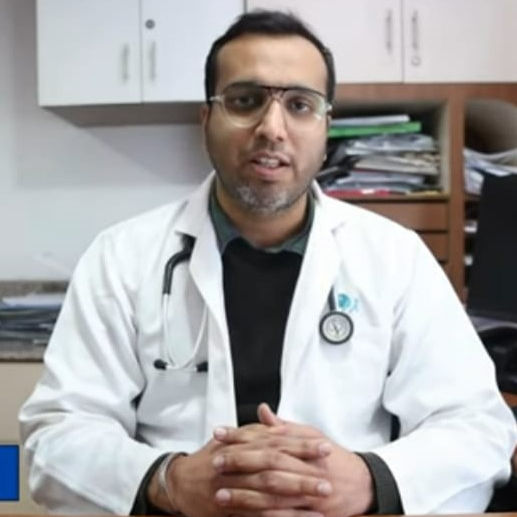Guide to Myths About Quitting Smoking
Discover the truth behind common myths about quitting smoking. Learn evidence-based facts on cessation methods, health benefits, addiction, vaping, and how to successfully quit with confidence.

Written by Dr. Md Yusuf Shareef
Reviewed by Dr. Rohinipriyanka Pondugula MBBS
Last updated on 13th Jan, 2026

Introduction
You’ve thought about it. Maybe you’ve even tried. But lurking in the back of your mind are those nagging doubts, the "what ifs" and "yeah buts" that have become the myths about quitting smoking. These myths are powerful mental barriers, often more intimidating than the physical cravings themselves. They convince us that quitting is impossible, pointless, or even harmful.
This article is your myth-busting guide. We’re going to dismantle these falsehoods one by one, replacing fear with facts. From misconceptions about weight gain and willpower to the truth about nicotine replacements and the "too late" fallacy, we'll provide clear, evidence-based information to help you embark on your smoke-free journey with confidence. Understanding the reality behind these smoking myths is the first crucial step toward taking back control of your health.
Consult Top Doctors for Personalised Advice
Myths About the "Right Way" to Quit
Many people never start their quitting journey because they're paralyzed by the idea of doing it the "wrong" way. Let’s
clear up the confusion around cessation methods.
Myth 1: "You Have to Quit Cold Turkey to Succeed"
This is one of the most pervasive myths about quitting. The image of the strong-willed person throwing away their pack
and never looking back is romanticised, but it is not the most effective method for everyone. Research indicates that
while some people succeed with abrupt cessation, a majority benefit from a planned approach using support and aids.
Cold turkey success stories are real, but they are not the only path. The "right" way to quit is the way that works for
you. For many, this involves nicotine replacement therapy (NRT) or prescription medications, which significantly
increase long-term success rates.
Myth 2: "If You Use a Nicotine Replacement, You Haven't Really Quit"
This myth confuses nicotine with smoking. The primary danger of smoking comes from the thousands of other
chemicals and tar inhaled, not the nicotine itself. Nicotine replacement therapy, like patches, gum, or lozenges, delivers
a controlled dose of nicotine without the harmful toxins. This allows you to manage withdrawal symptoms while you
break the psychological and behavioural habit of smoking. Once free from the hand-to-mouth ritual and associated
triggers, you can gradually wean off the nicotine. Using NRT is not cheating; it is a medically proven strategy to treat a
substance use disorder.
Myth 3: "Reducing Cigarettes Gradually is Just as Effective"
While cutting down may feel like a step in the right direction, it often prolongs the addiction without addressing the
underlying dependency. When you smoke fewer cigarettes, you may unconsciously smoke each one more intensely to
get your nicotine fix, maintaining high levels of toxins in your body. A study published in the Annals of Internal
Medicine found that smokers who quit abruptly were more likely to be non-smokers after six months than those who
gradually reduced. Setting a firm quit date and sticking to it provides a clear psychological line in the sand.
Myths About Health and the Body
These myths prey on fears about well-being, sometimes twisting facts to create excuses for continuing the habit.
Myth 4: "Quitting Will Cause Massive Weight Gain"
The fear of quitting smoking causing weight gain is a major concern for many, particularly women. Some people gain
weight after quitting; typically, 5 to 10 pounds on average. This happens because nicotine is an appetite suppressant and
slightly increases metabolism. When you quit, your appetite and metabolism return to normal. However, this weight
gain is not inevitable. Staying hydrated, having healthy snacks like carrots or apples on hand, and incorporating
physical activity can help manage weight. The health benefits of quitting far outweigh the risk of modest, manageable
weight gain.
Myth 5: "The Damage is Already Done, So It's Too Late to Quit"
This is perhaps the most dangerous myth. Your body begins to repair itself within hours of your last cigarette. Within 20
minutes, your heart rate drops. Within 12 hours, carbon monoxide levels in your blood normalise. The risk of coronary
heart disease, stroke, and lung cancer begins to drop significantly within the first few years of quitting. Even for long-
term smokers, quitting after 30 years can add years to your life and improve its quality. It is never too late to benefit
from quitting.
Myth 6: "Smoking Relieves My Stress and Anxiety"
This myth feels true because nicotine creates an immediate, temporary sense of relaxation by triggering dopamine
release. However, this is an illusion. Nicotine withdrawal between cigarettes actually increases overall stress levels and
anxiety. When you quit, after the initial withdrawal period, your baseline stress and anxiety typically decrease. Learning
to manage stress without relying on a substance is key. If anxiety is a major trigger for your smoking, consulting a
therapist or a doctor online with Apollo24|7 can provide healthier coping strategies.
Myths About Addiction and Willpower
These myths distort understanding of nicotine dependence, leading to feelings of shame and helplessness.
Myth 7: "I'm Too Addicted; I Could Never Quit"
Nicotine is highly addictive, on par with heroin and cocaine. Framing it as a lack of "willpower" is unhelpful. Addiction
is a chronic disease. The goal is not sheer grit but using the right tools: behavioural support, counselling, and
medication. Millions of heavily addicted people have quit successfully by acknowledging their addiction and using
appropriate support.
Myth 8: "It's Just a Habit, Not a Real Addiction"
Minimising smoking as a "bad habit" undermines the physiological nature of nicotine addiction. A habit is biting your
nails; an addiction rewires your brain to crave a substance. Understanding the difference dictates the solution. Breaking
a habit requires effort; overcoming an addiction often requires a multi-faceted treatment plan.
Myth 9: "If I Fail Once, I've Failed for Good"
A slip-up, smoking one or two cigarettes after quitting, is not a failure. It is common for many people. The key is not
letting a lapse become a full relapse. Analyse triggers, learn from the slip, and recommit to your quit plan. Self-criticism
only increases the likelihood of relapse.
Modern Misconceptions: Vaping and "Light" Smoking
New products and old marketing tricks have created a new set of myths.
Myth 10: "Switching to E-Cigarettes or Vaping Isn't Quitting"
Public Health England maintains that vaping is at least 95% less harmful than smoking tobacco. For smokers who have
struggled with other methods, switching completely to vaping can be a form of harm reduction. However, the goal
should be to eventually become nicotine-free. While safer than smoking, the long-term health effects of vaping are still
unknown. The best option is always approved smoking cessation methods like NRT or non-nicotine medications under
medical guidance.
Myth 11: "Smoking 'Light' or 'Low-Tar' Cigarettes is Safer"
This is a classic case of misleading marketing. "Light" cigarettes are not safer. Smokers often compensate by inhaling
more deeply or smoking more to maintain nicotine levels, consuming similar amounts of tar and nicotine. Light cigarettes are not less harmful.
Your Action Plan: Moving Beyond the Myths
With the myths busted, it is time for action.
- Set a Date: Choose a quit date within the next two weeks.
- Tell Your Support System: Inform family and friends to build accountability.
- Identify Triggers: Know your smoking triggers, whether coffee, stress, or alcohol, and plan alternatives.
- Seek Professional Help: Talk to a doctor online with Apollo24|7 to discuss the best cessation aids for you, whether
NRT or prescription medication. - Consider a Health Check: Apollo24|7 offers home collection for tests like a Lipid Profile or HbA1c to establish a
baseline and monitor health improvements after quitting.
Get Your Health Assessment Done
Conclusion
Debunking myths about quitting smoking is about empowering yourself with the truth. These false beliefs thrive in uncertainty. Quitting is challenging but achievable and immensely rewarding. The path is not about perfect willpower; it is about preparation, support, and perseverance. Your body begins healing the moment you put out your last cigarette. Temporary withdrawal discomfort is a small price for a lifetime of better health, increased energy, and freedom from
addiction. You have the facts, and the myths are just that—myths. Take the first step. Your future self will thank you.
Consult Top Pulmonologists
Consult Top Pulmonologists

Dr. P Sravani
Pulmonology Respiratory Medicine Specialist
3 Years • MBBS, MD
Visakhapatnam
Apollo Clinic Vizag, Visakhapatnam

Dr Rakesh Bilagi
Pulmonology Respiratory Medicine Specialist
10 Years • MBBS MD PULMONOLOGIST
Bengaluru
Apollo Clinic, JP nagar, Bengaluru

Dr. E Prabhakar Sastry
General Physician/ Internal Medicine Specialist
40 Years • MD(Internal Medicine)
Manikonda Jagir
Apollo Clinic, Manikonda, Manikonda Jagir
(175+ Patients)

Dr. K Prasanna Kumar Reddy
Pulmonology Respiratory Medicine Specialist
16 Years • MBBS, DTCD (TB&CHEST), DNB (PULM MED), FCCP
Hyderabad
Apollo Medical Centre Kondapur, Hyderabad

Dr Ishan Gupta
Pulmonology Respiratory Medicine Specialist
9 Years • MBBS, DNB RESPIRATORY DISEASES
Delhi
Apollo Hospitals Indraprastha, Delhi
(75+ Patients)
Consult Top Doctors for Personalised Advice

Dr. P Sravani
Pulmonology Respiratory Medicine Specialist
3 Years • MBBS, MD
Visakhapatnam
Apollo Clinic Vizag, Visakhapatnam

Dr Rakesh Bilagi
Pulmonology Respiratory Medicine Specialist
10 Years • MBBS MD PULMONOLOGIST
Bengaluru
Apollo Clinic, JP nagar, Bengaluru

Dr. E Prabhakar Sastry
General Physician/ Internal Medicine Specialist
40 Years • MD(Internal Medicine)
Manikonda Jagir
Apollo Clinic, Manikonda, Manikonda Jagir
(175+ Patients)

Dr. K Prasanna Kumar Reddy
Pulmonology Respiratory Medicine Specialist
16 Years • MBBS, DTCD (TB&CHEST), DNB (PULM MED), FCCP
Hyderabad
Apollo Medical Centre Kondapur, Hyderabad

Dr Ishan Gupta
Pulmonology Respiratory Medicine Specialist
9 Years • MBBS, DNB RESPIRATORY DISEASES
Delhi
Apollo Hospitals Indraprastha, Delhi
(75+ Patients)
More articles from respiratory-conditions
Frequently Asked Questions
Q1. How long do nicotine withdrawal symptoms last?
Physical withdrawal symptoms (cravings, irritability, anxiety) are strongest in the first 3–5 days and reduce significantly within 2–4 weeks. The psychological habit can take longer to break, making behavioural strategies important.
Q2. Is it normal to cough more after quitting smoking?
Yes. The cilia in your airways, paralysed by smoke, begin to recover, moving mucus and toxins out of your lungs. This can cause a temporary 'smoker's cough,' usually clearing up within a few weeks.
Q3. What is the most effective method for quitting smoking?
There is no single method for everyone. Combining medication (NRT or prescription drugs) with behavioural counselling or support groups gives the highest chance of long-term success.
Q4. Can quitting smoking improve mental health?
Absolutely. Although withdrawal can be tough initially, quitting is associated with reduced depression, anxiety, and stress. Regaining control over your life also boosts self-esteem and well-being.
Q5. When should I see a doctor about quitting?
It is advisable to talk to a doctor before quitting, especially if you have existing health conditions or previous failed attempts. A doctor from Apollo24|7 can help create a personalised quit plan and prescribe effective medications.



